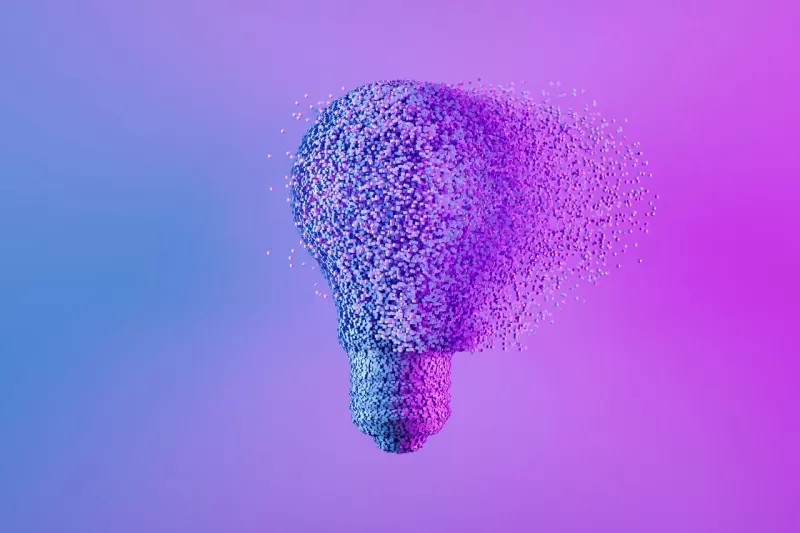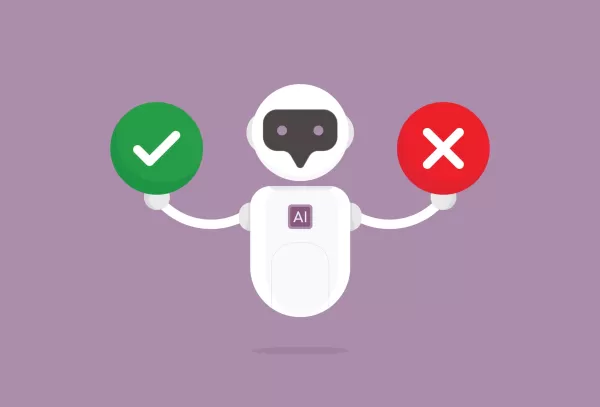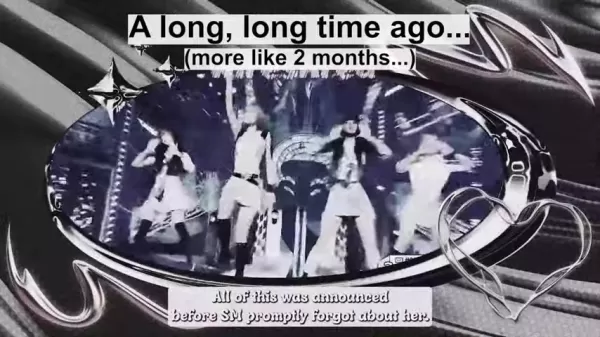Will AI destroy human creativity? No - and here's why

Let's dive into a topic that's not just about tech trends but could seriously impact your livelihood or business. Trust me, I'm not trying to be dramatic here, but getting this wrong could have real consequences. 😩 And trust me, it's a complex topic that shifts every single day.
Also, ever wondered how folks are turning AI into millions? Check out how regular people are cashing in on AI.
The question of whether AI could threaten creativity and innovation is tricky, and my take on it might surprise you.
Quick Intro
If you're new here, I'm Lester, but feel free to call me Les. 👋 I'm a founder who's had a successful exit and now I'm the executive chairman of a group of e-commerce brands. At heart, I'm a performance marketer who's won awards and has a keen eye for spotting trends.
Also, there's a billion-dollar AI company flying under the radar - and you should definitely know about it.
I've been diving into the latest trends that are shaking up how businesses grow and succeed. If you're after clear, actionable insights without the fluff, sign up for my newsletter, No Fluff Just Facts. It's packed with trend analyses and strategies to help you drive growth, and the best part? It's totally free. ✅
The History of AI and How We Got Here
The New York Times ran an intriguing piece called "Electronic Brain Teaches Itself," shining a spotlight on the Perceptron, an early AI project backed by the US Navy. This machine was supposed to be the first non-living entity capable of "perceiving, recognizing, and identifying its surroundings without human training or control." Pretty ambitious, huh?
Also, have you heard about Perplexity? It's the AI tool that Gemini wishes it could be.
The Perceptron was supposed to walk, talk, write, and even develop a sense of self. 😳 But despite all the hype, this "Electronic Brain" was limited to simple symbolic manipulations and logic problems. It couldn't handle complex decision-making and cost a hefty $100,000 back in 1958. Oops, did I forget to mention the year? My bad. But hey, how's that for cheeky?
The Perceptron could never! 😏 Before you jump on me saying "That's not recent," let me ask if you've seen a Christopher Nolan movie. Time is relative, right? My exaggerated point aside, the lesson here is that AI isn't new to the scene.
Fast forward a decade, like Cooper diving into a black hole, and we meet Shakey. Life Magazine dubbed it the "First Electronic Person," and it was an autonomous robot meant to navigate hallways like I navigate to the fridge for a midnight snack. No lights and no AI help, lol. 🤭
Also, I tested 10 AI content detectors, and these 3 nailed identifying AI text every time.
But there was a catch with Shakey: when it hit an obstacle, it would just stop, looking like it was thinking, but it wasn't. I'm taking you through this history lesson because context is key. Understanding AI's past helps us navigate its present and future, especially when we're tackling big questions like whether AI can kill creativity or stifle human innovation.
What Changed?
Things are definitely different now than they were in 1958. A big part of that is thanks to generative AI tools like ChatGPT and Midjourney. These tools can churn out human-like text, art, and even video. What used to be a uniquely human skill is now within a machine's grasp. 🦾
Also, AI isn't the next big thing - here's what is.
Today's AI models do more than just automate tasks. They engage with users, understand conversational input, simulate thought processes, and adapt to preferences. This adaptability comes from machine learning, constantly improving by analyzing vast amounts of data. This has made AI smarter and more user-friendly for both individuals and businesses.
The impact on creative industries is clear. AI tools can design logos, generate intricate artwork, and write compelling narratives, opening up new possibilities for creators. These advancements are changing how people work, create, and innovate. Generative AI has become a focus in business strategies, with companies using these technologies to boost efficiency and engage with their audiences in new ways. 🧠
The Million-Dollar Question
Now that we've explored AI's history and evolution, let's tackle the big question: Can AI truly threaten human creativity and innovation?
The answer? It's complicated. 😩
AI tools like DALL-E and GPT-4 are undeniably impressive. They act as sophisticated pattern recognizers and generators. These tools can enhance human creativity but don't possess the essence of true innovation, which comes from human experience and originality.
Also, the work tasks people use Claude AI for most, according to Anthropic.
This brings up an important question: if AI is trained solely on human work, can we ever genuinely call it creative or innovative? Creativity and innovation aren't just about producing content; they're rooted in original thought, emotional depth, and cultural relevance.
Someone recently asked me where I got my sense of humor. My answer? Childhood trauma. 🤧 I'm kidding, but the truth is, our experiences shape who we are and drive the art we create. It's this drive to fill a gap that often sparks true innovation. AI can mimic this but can't innovate like humans do when fueled by curiosity and emotion.
For now, the answer is no. 🚫
Also, are we losing our critical thinking skills to AI? A new Microsoft study raises red flags.
These qualities remain distinctly human. As long as AI needs to be "trained," it will reflect what already exists, a sophisticated echo of humanity rather than an originator. On the flip side, just because AI doesn't have original thoughts doesn't mean it won't make some jobs redundant while creating entirely new ones. In fact, according to an MIT paper, 63% of the jobs people do today didn't even exist in the 1940s, showing how technology has constantly reshaped the job market in unexpected ways. 💼
My Two Cents
Here's my unsolicited advice after mulling this over: Life is all about change, and embracing it is the only way forward. Technology is doing what it's designed to do: make our lives easier. To resist it is to resist progress itself. 🧐
That said, human creativity isn't being erased; it's evolving. Perhaps the designers and writers of tomorrow won't disappear but transform into prompt engineers, crafting ideas in collaboration with these tools, mastering a new kind of artistry. Let's be honest: just because AI creates something doesn't mean it's good.
Also, AI humanoid robots are stepping closer - thanks to a new $350 million investment.
The ability to discern, curate, and refine that intangible "eye" for greatness will always remain profoundly human. Unless, of course, Skynet becomes a reality. But even then, humanity's creativity, adaptability, and resilience will likely shine through.
By the way, do you want more data-driven business insights that drive growth? Sign up for my free newsletter, No Fluff Just Facts. I share what's working, the latest trends, and the occasional pep talk to keep you inspired. If this sounds like your jam and you want to be besties forever, click here to sign up - it's totally FREE!
😇 Hope this helps, I'm rooting for you.
Related article
 Study Reveals Concise AI Responses May Increase Hallucinations
Instructing AI chatbots to provide brief answers may lead to more frequent hallucinations, a new study suggests.A recent study by Giskard, a Paris-based AI evaluation firm, explored how prompt phrasin
Study Reveals Concise AI Responses May Increase Hallucinations
Instructing AI chatbots to provide brief answers may lead to more frequent hallucinations, a new study suggests.A recent study by Giskard, a Paris-based AI evaluation firm, explored how prompt phrasin
 Venture Capital Firms Explore AI-Driven Acquisitions of Established Businesses
Venture capitalists traditionally invest in tech-driven companies that disrupt industries or pioneer new markets.However, some VCs are shifting their approach. Instead of backing startups, they are ac
Venture Capital Firms Explore AI-Driven Acquisitions of Established Businesses
Venture capitalists traditionally invest in tech-driven companies that disrupt industries or pioneer new markets.However, some VCs are shifting their approach. Instead of backing startups, they are ac
 Naevis's K-Pop Breakthrough: Exploring AI Idols and Entertainment Ethics
K-Pop continues to innovate, blending music, performance, and cutting-edge technology. The rise of AI idols—virtual performers free from human constraints—has sparked widespread discussion. Naevis, a
Comments (21)
0/200
Naevis's K-Pop Breakthrough: Exploring AI Idols and Entertainment Ethics
K-Pop continues to innovate, blending music, performance, and cutting-edge technology. The rise of AI idols—virtual performers free from human constraints—has sparked widespread discussion. Naevis, a
Comments (21)
0/200
![EricScott]() EricScott
EricScott
 July 31, 2025 at 10:48:18 PM EDT
July 31, 2025 at 10:48:18 PM EDT
This article really got me thinking! AI might not kill creativity, but it’s shaking things up. I’m curious—how do artists feel about AI tools stealing their vibe? 🤔 Still, it’s exciting to see where this tech takes us!


 0
0
![JustinJohnson]() JustinJohnson
JustinJohnson
 April 22, 2025 at 11:46:52 AM EDT
April 22, 2025 at 11:46:52 AM EDT
This app really opened my eyes to how AI can actually boost creativity instead of killing it. It's a bit heavy on the tech jargon though, which made it hard to follow at times. Still, it's a must-read for anyone worried about AI's impact on creativity. 🤓


 0
0
![RalphGarcia]() RalphGarcia
RalphGarcia
 April 21, 2025 at 9:13:16 AM EDT
April 21, 2025 at 9:13:16 AM EDT
このアプリは、AIが創造性を殺すのではなく、実際にそれを高めることができることを教えてくれました。ただ、技術用語が多くて時々理解しづらかったです。それでも、AIが創造性に与える影響を心配している人には必読です。🤓


 0
0
![RyanAdams]() RyanAdams
RyanAdams
 April 21, 2025 at 6:59:06 AM EDT
April 21, 2025 at 6:59:06 AM EDT
Este aplicativo realmente abriu meus olhos para como a IA pode aumentar a criatividade em vez de destruí-la. No entanto, é um pouco pesado no jargão técnico, o que dificultou o acompanhamento em alguns momentos. Ainda assim, é uma leitura obrigatória para quem está preocupado com o impacto da IA na criatividade. 🤓


 0
0
![AnthonyJohnson]() AnthonyJohnson
AnthonyJohnson
 April 20, 2025 at 9:17:42 PM EDT
April 20, 2025 at 9:17:42 PM EDT
Esta aplicación te hace pensar en la IA y la creatividad. No es solo una cuestión tecnológica, ¡es sobre nuestro futuro! Al principio estaba escéptico, pero la forma en que desglosa el tema es muy esclarecedora. Es imprescindible para quien se preocupe por la IA tomando el control. ¿Quizás la próxima vez podrían añadir quizzes interactivos? 🤔


 0
0
![WillieJones]() WillieJones
WillieJones
 April 20, 2025 at 2:11:13 AM EDT
April 20, 2025 at 2:11:13 AM EDT
Esta aplicación realmente me abrió los ojos sobre cómo la IA puede aumentar la creatividad en lugar de destruirla. Sin embargo, es un poco pesada en jerga técnica, lo que la hizo difícil de seguir en algunos momentos. Aún así, es una lectura obligada para cualquiera preocupado por el impacto de la IA en la creatividad. 🤓


 0
0

Let's dive into a topic that's not just about tech trends but could seriously impact your livelihood or business. Trust me, I'm not trying to be dramatic here, but getting this wrong could have real consequences. 😩 And trust me, it's a complex topic that shifts every single day.
Also, ever wondered how folks are turning AI into millions? Check out how regular people are cashing in on AI.
The question of whether AI could threaten creativity and innovation is tricky, and my take on it might surprise you.
Quick Intro
If you're new here, I'm Lester, but feel free to call me Les. 👋 I'm a founder who's had a successful exit and now I'm the executive chairman of a group of e-commerce brands. At heart, I'm a performance marketer who's won awards and has a keen eye for spotting trends.
Also, there's a billion-dollar AI company flying under the radar - and you should definitely know about it.
I've been diving into the latest trends that are shaking up how businesses grow and succeed. If you're after clear, actionable insights without the fluff, sign up for my newsletter, No Fluff Just Facts. It's packed with trend analyses and strategies to help you drive growth, and the best part? It's totally free. ✅
The History of AI and How We Got Here
The New York Times ran an intriguing piece called "Electronic Brain Teaches Itself," shining a spotlight on the Perceptron, an early AI project backed by the US Navy. This machine was supposed to be the first non-living entity capable of "perceiving, recognizing, and identifying its surroundings without human training or control." Pretty ambitious, huh?
Also, have you heard about Perplexity? It's the AI tool that Gemini wishes it could be.
The Perceptron was supposed to walk, talk, write, and even develop a sense of self. 😳 But despite all the hype, this "Electronic Brain" was limited to simple symbolic manipulations and logic problems. It couldn't handle complex decision-making and cost a hefty $100,000 back in 1958. Oops, did I forget to mention the year? My bad. But hey, how's that for cheeky?
The Perceptron could never! 😏 Before you jump on me saying "That's not recent," let me ask if you've seen a Christopher Nolan movie. Time is relative, right? My exaggerated point aside, the lesson here is that AI isn't new to the scene.
Fast forward a decade, like Cooper diving into a black hole, and we meet Shakey. Life Magazine dubbed it the "First Electronic Person," and it was an autonomous robot meant to navigate hallways like I navigate to the fridge for a midnight snack. No lights and no AI help, lol. 🤭
Also, I tested 10 AI content detectors, and these 3 nailed identifying AI text every time.
But there was a catch with Shakey: when it hit an obstacle, it would just stop, looking like it was thinking, but it wasn't. I'm taking you through this history lesson because context is key. Understanding AI's past helps us navigate its present and future, especially when we're tackling big questions like whether AI can kill creativity or stifle human innovation.
What Changed?
Things are definitely different now than they were in 1958. A big part of that is thanks to generative AI tools like ChatGPT and Midjourney. These tools can churn out human-like text, art, and even video. What used to be a uniquely human skill is now within a machine's grasp. 🦾
Also, AI isn't the next big thing - here's what is.
Today's AI models do more than just automate tasks. They engage with users, understand conversational input, simulate thought processes, and adapt to preferences. This adaptability comes from machine learning, constantly improving by analyzing vast amounts of data. This has made AI smarter and more user-friendly for both individuals and businesses.
The impact on creative industries is clear. AI tools can design logos, generate intricate artwork, and write compelling narratives, opening up new possibilities for creators. These advancements are changing how people work, create, and innovate. Generative AI has become a focus in business strategies, with companies using these technologies to boost efficiency and engage with their audiences in new ways. 🧠
The Million-Dollar Question
Now that we've explored AI's history and evolution, let's tackle the big question: Can AI truly threaten human creativity and innovation?
The answer? It's complicated. 😩
AI tools like DALL-E and GPT-4 are undeniably impressive. They act as sophisticated pattern recognizers and generators. These tools can enhance human creativity but don't possess the essence of true innovation, which comes from human experience and originality.
Also, the work tasks people use Claude AI for most, according to Anthropic.
This brings up an important question: if AI is trained solely on human work, can we ever genuinely call it creative or innovative? Creativity and innovation aren't just about producing content; they're rooted in original thought, emotional depth, and cultural relevance.
Someone recently asked me where I got my sense of humor. My answer? Childhood trauma. 🤧 I'm kidding, but the truth is, our experiences shape who we are and drive the art we create. It's this drive to fill a gap that often sparks true innovation. AI can mimic this but can't innovate like humans do when fueled by curiosity and emotion.
For now, the answer is no. 🚫
Also, are we losing our critical thinking skills to AI? A new Microsoft study raises red flags.
These qualities remain distinctly human. As long as AI needs to be "trained," it will reflect what already exists, a sophisticated echo of humanity rather than an originator. On the flip side, just because AI doesn't have original thoughts doesn't mean it won't make some jobs redundant while creating entirely new ones. In fact, according to an MIT paper, 63% of the jobs people do today didn't even exist in the 1940s, showing how technology has constantly reshaped the job market in unexpected ways. 💼
My Two Cents
Here's my unsolicited advice after mulling this over: Life is all about change, and embracing it is the only way forward. Technology is doing what it's designed to do: make our lives easier. To resist it is to resist progress itself. 🧐
That said, human creativity isn't being erased; it's evolving. Perhaps the designers and writers of tomorrow won't disappear but transform into prompt engineers, crafting ideas in collaboration with these tools, mastering a new kind of artistry. Let's be honest: just because AI creates something doesn't mean it's good.
Also, AI humanoid robots are stepping closer - thanks to a new $350 million investment.
The ability to discern, curate, and refine that intangible "eye" for greatness will always remain profoundly human. Unless, of course, Skynet becomes a reality. But even then, humanity's creativity, adaptability, and resilience will likely shine through.
By the way, do you want more data-driven business insights that drive growth? Sign up for my free newsletter, No Fluff Just Facts. I share what's working, the latest trends, and the occasional pep talk to keep you inspired. If this sounds like your jam and you want to be besties forever, click here to sign up - it's totally FREE!
😇 Hope this helps, I'm rooting for you.
 Study Reveals Concise AI Responses May Increase Hallucinations
Instructing AI chatbots to provide brief answers may lead to more frequent hallucinations, a new study suggests.A recent study by Giskard, a Paris-based AI evaluation firm, explored how prompt phrasin
Study Reveals Concise AI Responses May Increase Hallucinations
Instructing AI chatbots to provide brief answers may lead to more frequent hallucinations, a new study suggests.A recent study by Giskard, a Paris-based AI evaluation firm, explored how prompt phrasin
 Venture Capital Firms Explore AI-Driven Acquisitions of Established Businesses
Venture capitalists traditionally invest in tech-driven companies that disrupt industries or pioneer new markets.However, some VCs are shifting their approach. Instead of backing startups, they are ac
Venture Capital Firms Explore AI-Driven Acquisitions of Established Businesses
Venture capitalists traditionally invest in tech-driven companies that disrupt industries or pioneer new markets.However, some VCs are shifting their approach. Instead of backing startups, they are ac
 Naevis's K-Pop Breakthrough: Exploring AI Idols and Entertainment Ethics
K-Pop continues to innovate, blending music, performance, and cutting-edge technology. The rise of AI idols—virtual performers free from human constraints—has sparked widespread discussion. Naevis, a
Naevis's K-Pop Breakthrough: Exploring AI Idols and Entertainment Ethics
K-Pop continues to innovate, blending music, performance, and cutting-edge technology. The rise of AI idols—virtual performers free from human constraints—has sparked widespread discussion. Naevis, a
 July 31, 2025 at 10:48:18 PM EDT
July 31, 2025 at 10:48:18 PM EDT
This article really got me thinking! AI might not kill creativity, but it’s shaking things up. I’m curious—how do artists feel about AI tools stealing their vibe? 🤔 Still, it’s exciting to see where this tech takes us!


 0
0
 April 22, 2025 at 11:46:52 AM EDT
April 22, 2025 at 11:46:52 AM EDT
This app really opened my eyes to how AI can actually boost creativity instead of killing it. It's a bit heavy on the tech jargon though, which made it hard to follow at times. Still, it's a must-read for anyone worried about AI's impact on creativity. 🤓


 0
0
 April 21, 2025 at 9:13:16 AM EDT
April 21, 2025 at 9:13:16 AM EDT
このアプリは、AIが創造性を殺すのではなく、実際にそれを高めることができることを教えてくれました。ただ、技術用語が多くて時々理解しづらかったです。それでも、AIが創造性に与える影響を心配している人には必読です。🤓


 0
0
 April 21, 2025 at 6:59:06 AM EDT
April 21, 2025 at 6:59:06 AM EDT
Este aplicativo realmente abriu meus olhos para como a IA pode aumentar a criatividade em vez de destruí-la. No entanto, é um pouco pesado no jargão técnico, o que dificultou o acompanhamento em alguns momentos. Ainda assim, é uma leitura obrigatória para quem está preocupado com o impacto da IA na criatividade. 🤓


 0
0
 April 20, 2025 at 9:17:42 PM EDT
April 20, 2025 at 9:17:42 PM EDT
Esta aplicación te hace pensar en la IA y la creatividad. No es solo una cuestión tecnológica, ¡es sobre nuestro futuro! Al principio estaba escéptico, pero la forma en que desglosa el tema es muy esclarecedora. Es imprescindible para quien se preocupe por la IA tomando el control. ¿Quizás la próxima vez podrían añadir quizzes interactivos? 🤔


 0
0
 April 20, 2025 at 2:11:13 AM EDT
April 20, 2025 at 2:11:13 AM EDT
Esta aplicación realmente me abrió los ojos sobre cómo la IA puede aumentar la creatividad en lugar de destruirla. Sin embargo, es un poco pesada en jerga técnica, lo que la hizo difícil de seguir en algunos momentos. Aún así, es una lectura obligada para cualquiera preocupado por el impacto de la IA en la creatividad. 🤓


 0
0





























